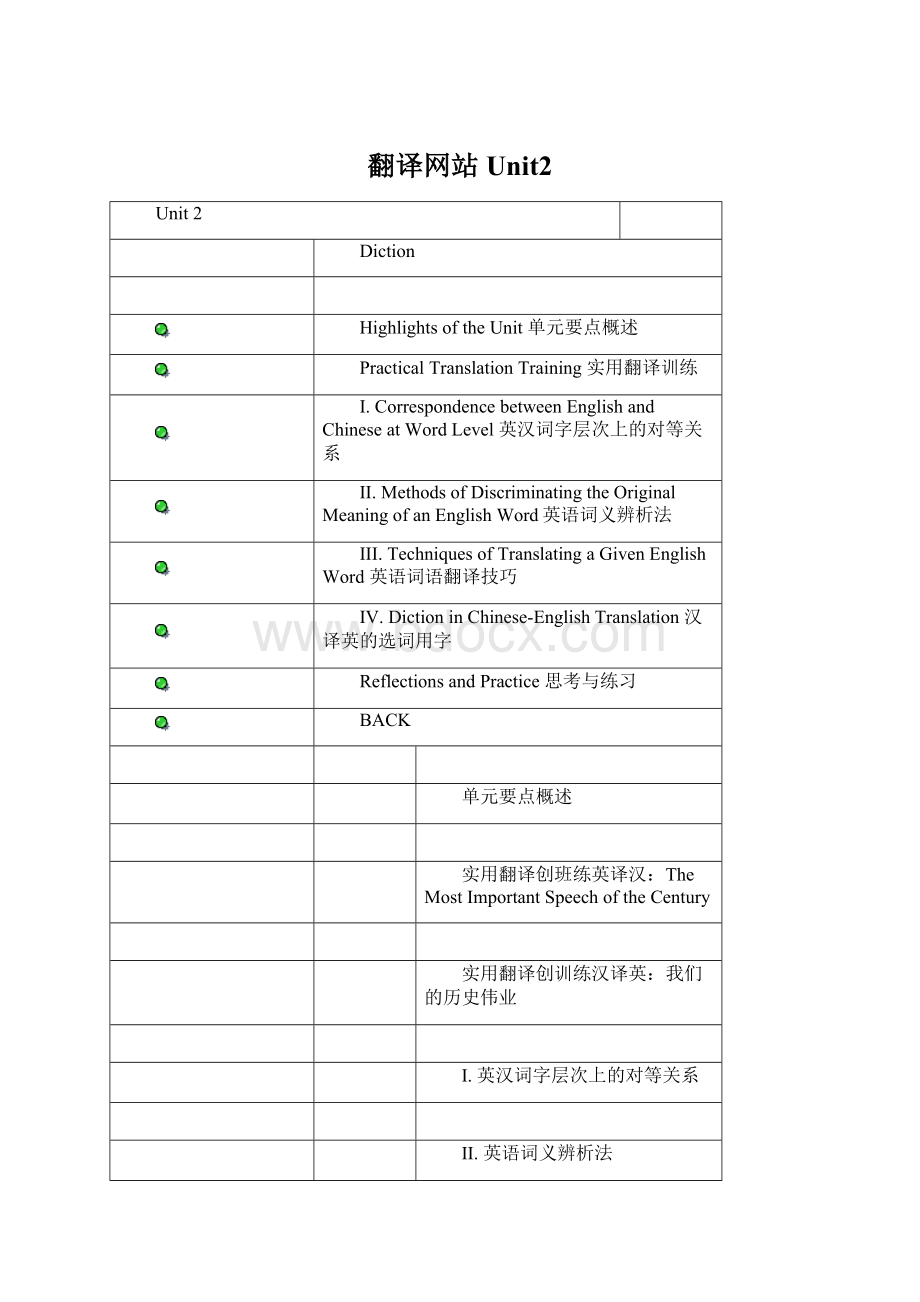翻译网站Unit2.docx
《翻译网站Unit2.docx》由会员分享,可在线阅读,更多相关《翻译网站Unit2.docx(37页珍藏版)》请在冰豆网上搜索。

翻译网站Unit2
Unit2
Diction
HighlightsoftheUnit单元要点概述
PracticalTranslationTraining实用翻译训练
I.CorrespondencebetweenEnglishandChineseatWordLevel英汉词字层次上的对等关系
II.MethodsofDiscriminatingtheOriginalMeaningofanEnglishWord英语词义辨析法
III.TechniquesofTranslatingaGivenEnglishWord英语词语翻译技巧
IV.DictioninChinese-EnglishTranslation汉译英的选词用字
ReflectionsandPractice思考与练习
BACK
单元要点概述
实用翻译创班练英译汉:
TheMostImportantSpeechoftheCentury
实用翻译创训练汉译英:
我们的历史伟业
I.英汉词字层次上的对等关系
II.英语词义辨析法
III.英语词语翻译技巧
IV.汉译英的选词用字
本单元阐述了翻译中的遣词用字问题,首先用对比的方式归纳了英汉词字层次上的五种对应情况:
1.词字对等,2.多词同义,3.一词多义,4.词义交织,5.无对等词语。
接着从四个角度探讨了如何判断某一英语词语的准确含义,即1.根据构词法辨别词义;2.根据指代关系辨别词义;3.根据上下文或词的搭配辨别词义;4.根据不同学科或专业类型辨别词义。
在词义辨析的基础上,本单元归纳了英语翻译的八种常用技巧:
1.推演法,2.移植法,3.引申法,4.替代法,5.释义法,6.合并法,7.图形法和8.音译法。
汉译英的遣词用字问题与英译汉的情况有所不同。
英译汉时我们输出的是自己所熟悉的汉语词汇、语法结构,而汉译英则需我们对大量的不那么熟悉的词汇做出取舍,然后再去套用语法规则,因此往往会显得力不从心—这就是为什么初学者普遍会认为,汉译英的难度大超过英译汉。
PracticalTranslationTraining
1.English-ChineseTranslation
TheMostImportantSpeechoftheCentury
Welearnedhowfaruphe'scomeonNewYear'sDaywhenevery:
Chinesenewspaperheraldeda6000-wordspeechinwhichDengsignaledtheendofthousandsofyearsofChinesexenophobia.
Itmayeventuallycometoberegardedthemostimportantspeechofthecentury.Forinit,theMaximumLeaderofthenationthatcomprisesone-fourthofmankindservednoticethatChinawasjoiningtherestoftheworld(saveAlbania)inthe20thcentury.
"Nocountrycandevelopbyclosingitsdoor,"saidDeng,"Wesufferedfromthis,andourforefatherssufferedfromthis."ReversingthousandsofyearsofofficialhostilitytotheworldoutsidetheGreatWall,Dengsaidsimply:
"IsolationlandedChinainpoverty,backwardnessandignorance."
ThisstartlingadmissioncontradictsthousandsofyearsofChinesepolicy,goingbackbeyondtheMingDynastytotheChinDynasty,whenthewallwaserectedtokeepbarbariansonhorsebackoutinthewildswheretheybelonged.
Deng'smessage:
DonotrenounceMarxism,butadoptcapitalistideaswheretheymakesense—"itcannotharmus."Economicreform,spearheadedbyyoungerleaders,isthesinglemostimportantbulwarkforthenation'ssecurity,foronlywitheconomicstrengthcanbombs,missilesandplanesbepurchased.
IfChinaistryingtocatchuptotherestoftheworldinthe20thcentury,maybethe21stcenturywillbelongtothem.Theyhavepeople,brainsandtheycanbeimpressivelydisciplined.Andtheirindustrialpotentialisawesome.
ItmaycometobecommonlyacceptedinthenextcenturythatthemostsignificantspeechevergivenbyafellowwithacowboyhatcamenotfromRonaldReaganbutfroman80-year-oldChineseman.
NotesandExplanations
1.howfaruphe'scome他已迈出了多大一步;comeup走上前
2.xenophobian.仇外;惧外者
3.cometoberegarded它最终有可能被认为是……;cometo达到……结果
4.servenotice通知,警告
5.therestoftheworld(除自身以外的)世界上的其他一些国家
6."Nocountrycandevelopbyclosingitsdoor,"saidDeng,"Wesufferedfromthis,andourforefatherssufferedfromthis."邓说:
“任何国家要发达起来,闭关自守都不可能。
我们吃过这个苦头,我们的老祖宗也吃过这个苦头。
”将此句回译成中文,应核对讲话原文,以确保译文准确无误。
7.land(in)使人陷入(坏状况)
8.keepout阻挡在外
9.capitalistideaswheretheymakesense资本主义合理的观念;makesense合理;有意义
10.spearheadv.做先锋,在前面带头
11.thesinglemostimportantbulwark最重要的保障;bulwarkn.壁垒,保障
12.Theyhavepeople,brains他们有人力,有人才
2.Chinese-EnglishTranslation
我们的历史伟业
从19世纪中叶到20世纪中叶的100年间,中国人民的一切奋斗,都是为了实现祖国的独立和民族的解放,彻底结束民族屈辱的历史。
这个历史伟业,我们已经完成了。
从20世纪中叶到21世纪中叶的100年间,中国人民的一切奋斗,则是为了实现祖国的富强、人民的富裕和民族的伟大复兴。
这个历史伟业,我们党领导全国人民已经奋斗了50年,取得了巨大的进展,再经过50年的奋斗,也必将胜利完成。
NotesandExplanations
1.19世纪中叶到20世纪中叶themid-19thtothemid-20thcentury
2.为了实现祖国的独立和民族的解放forthesakeofachievingindependenceofourcountryandliberationofournation
3.彻底结束putanendto...onceandforall
4.民族屈辱nationalhumiliation
5.历史伟业greathistoriccause
6.(实现)民族的伟大复兴(make)thenationimmenselyrejuvenated
7.取得了巨大的进展maketremendousprogress
8.胜利完成(目标)successfullyattaintheobjective
By"diction"wemeantheproperchoiceofwordsandphrasesintranslationonthebasisofaccuratecomprehensionoftheoriginal.
Inthepracticeoftranslation,whatperplexesusmostfrequentlyishowtofindanequivalentinthetargetlanguage.Greatcareiscalledforinthetranslationof"familiar"EnglishwordsintoChinese,astheirmeaningsvarywiththechangeincollocationorcontext.Takethefollowingsimplesentenceforexample:
Tensionisbuildingup.
Withoutcontext,both"tension"and"buildup"mayhavevariousexplanations.ThusthisEnglishsentencemaybetranslatedintodifferentChineseexpressionsaccordingly:
●形势紧张起来。
●张力在增大。
●电压在增加。
●压力在增强。
Justasanotedlinguisthasobserved,"themeaningofawordisitsuseinthelanguage",and"eachword,whenusedinanewcontext,isanewword".Theaboveexampleisagoodillustrationofthissaying.MoreexamplesmaybefoundintheabovePracticalTranslationTraining,suchas"howfaruphe'scome"(他已迈出了多大一步),"eventuallycometoberegarded"(最终有可能被认为是),"sufferedfrom"(吃苦头),"Theyhavepeople,brains"(他们有人力,有人才),andsoon.
IncomparisonwithChinese,Englishwordsaregenerallymoreflexiblebothinformandinmeaning,thereforeitisoftenahardtaskforatranslatortofindtheirChineseequivalentsthataresuitabletotheoccasion.Taketheword"story"forexample:
(1)Thiswarisbecomingthemostimportantstoryofthisgeneration.
(2)Itisquiteanotherstorynow.
(3)Somereporterswhowerenotincludedinthesessionbrokethestory.
(4)He'llbeveryhappyifthatstoryholdsup.
(5)TheRitaHaywothstoryisoneofthesaddest.
(6)Whatastory!
Idon'tbelieveawordofit.
(7)LastDecemberthePostfirstreportedthatprobeswerebeingmadeineachofthosecities,but officialsrefusedtoconfirmthestory.
(8)ThestoryabouthimbecamesmallerandbyandbyfadedoutfromtheAmericanTV.
Aswecanjudgefromthecontext,the“story's"intheabovesentencesindicatedifferentsensesrespectively:
(1)"event";
(2)"situation";(3)"insideinformation";(4)"statement";(5)"experience";(6)"lie";(7)"news";(8)"report".Andtherefore,thecorrespondingChineseversionsshouldbe:
(1)这场战争将成为这一代人所经历的最重大的事件。
(2)现在的情况完全不同了。
(3)有些未获准参加那次会议的记者把内情捅出去了。
(4)如果这一说法当真,那他就太高兴了。
(5)丽泰·海华丝的遭遇算最惨的了。
(6)弥天大谎!
我只字不信。
(7)去年12月,《邮报》首先报道调查工作已在那些城市里进行,但官员们拒绝证实这条消息。
(8)报道中对他的渲染减少了,不久就从美国电视上销声匿迹了。
Ontheotherhand,aChinesewordorphrasemayhaveavarietyofEnglishequivalentsaccordingtodifferentsituations.Let'staketheChineseexpression“情况”forexample:
●在这种情况下undersuchcircumstances(suchbeingthecase)
●这种情况必须改变。
Thisstateofaffairsmustchange.
●现在的情况不同了。
Nowthingsaredifferent.
●他们的情况怎么样?
Howdomattersstandwiththem?
●前线有什么情况?
Howisthesituationatthefront?
●我们可能去那儿,那得看情况而定。
Wemaygothere,butthatdepends.
Apparently,nofixedpatternofword-for-wordtransformationisavailabletoeitherEnglish-ChineseorChinese-Englishtranslation.
I.CorrespondencebetweenEnglishandChineseatWordLevel
Fromtheaboveillustrationswemaycometorealizethatinmostcasesthereisnoexistingpatternforsentencetranslation,noraretherefixedrulesforwordtransformation.Generallyspeaking,thecorrespondencebetweenEnglishandChineseatwordlevelmaybecategorizedasfollows:
1.Word-for-WordCorrespondence
Thisismostevidentlyshowninpropernounsandtechnicalterms.Forexample:
●Marxism=马克思主义
●Aspirin=阿斯匹林
●激光=laser
●白血病=leukemia
2.OneWordwithMultipleEquivalentsoftheSameMeaning
Thisisacommoncaseintranslation.Forexample:
●wife:
妻子、爱人、夫人、老婆、老伴、媳妇、堂客、内人……
●potato:
马铃薯、洋芋、土豆、山药蛋……
●人:
humanbeing,man,people,person...
●犬:
dog,hound,spaniel,mastiff,pointer,setter,retriever,terrier...
3.OneWordwithSeveralEquivalentsofDifferentMeanings
Thisisalsoverycommonintranslation.Forexample:
●cousin:
堂兄、堂弟、堂姐、堂妹、表哥、表弟、表姐、表妹、卿……
●president:
总统、总裁、主席、董事长、议长、会长、社长、校长……
●carry:
搬、运、送、提、拎、挑、担、抬、背、扛、接、抱、端、举、夹、捧……
●走:
walk,saunter,amble,stride,trudge,trapes,shamble,prance,scamper,clump,tiptoe...
●机:
machine,engine,plane,aircraft...
●羊:
sheep,goat,ram,ewe,lamb...
4.EquivalentsInterwovenwithOneAnother
Inthiscase,acertainwordmaybetreateddifferentlyaccordingtovariouscircumstancesorcollocations.Forexample:
5.WordswithoutEquivalents
Inthiscase,anexplanationisgiveninsteadofanequivalent.Forexample:
●teenager:
13至19岁的青少年
●prey:
被捕食的动物
●clock-watcher:
老是看钟等下班的人
●阴:
(inChinesethought)thesoft,inactive,femaleprincipleorforceintheword
●阳:
(inChinesethought)thestrong,active,maleprincipleorforceintheworld
●目不识丁:
(notknowone's)
II.MethodsofDis